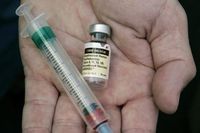In a sweeping show of unity, the VCU Massey Comprehensive Cancer Center, together with 61 other National Cancer Institute (NCI)-Designated Cancer Centers and several of the nation’s leading cancer health organizations, has issued a powerful joint statement urging Americans to prioritize the human papillomavirus (HPV) vaccination for cancer prevention. The statement, also endorsed by the University of Puerto Rico Comprehensive Cancer Center, represents a concerted effort to rally health care systems, providers, parents, and caregivers across the country around a simple but critical message: the HPV vaccine saves lives by preventing cancer.
This coordinated call to action comes at a pivotal time. September marks Gynecologic Cancer Awareness Month, a period dedicated to raising public consciousness about cancers such as cervical, vaginal, and vulvar—diseases for which HPV is a primary cause. The campaign also coincides with the back-to-school season, when most children ages nine to twelve are due for routine vaccinations, making it an opportune moment to reach families about the importance of HPV immunization.
The urgency behind the statement is underscored by sobering statistics. According to the National Immunization Survey (NIS)-Teen data cited by VCU Massey Comprehensive Cancer Center, nearly 80 million Americans—roughly one in every four people—are currently infected with HPV. Of those, more than 40,000 will be diagnosed with an HPV-related cancer this year, and hundreds of thousands more will face pre-cancerous conditions directly attributable to the virus. Despite the availability of a highly effective vaccine, coverage rates for HPV vaccination remain significantly lower than those for other recommended adolescent vaccines, a gap that experts say must be closed if the nation hopes to eliminate these cancers as a public health threat.
“Consistent with our commitment to the concept of ‘one team, one fight,’ Massey continues to align with other NCI-designated Comprehensive Cancer Centers to jointly endorse the importance of HPV vaccination,” said Dr. Kim Rhoads, associate director of community engagement at Massey and professor of surgery in the Division of Colon and Rectal Surgery, in a statement quoted by WRIC. “Only a handful of cancers are truly preventable. Six of those preventable cancers are caused by HPV infection. Reducing HPV infection through vaccination will put our country on track to potentially eliminate these cancers.”
The six types of cancer that can be prevented by HPV vaccination are oropharyngeal, cervical, anal, vaginal, vulvar, and penile cancers. The Centers for Disease Control and Prevention (CDC) and the American Academy of Pediatrics both recommend vaccination for preteens, ideally at ages nine to twelve, to ensure protection before any potential exposure to the virus. The safety and efficacy of the HPV vaccine have been demonstrated in multiple large-scale studies, providing long-lasting protection against the most dangerous cancer-causing strains of HPV.
“Cervical cancer is almost entirely preventable,” emphasized Dr. Jaclyn Wall, a gynecologic oncologist at Massey, as quoted in both VCU Massey’s release and WRIC’s reporting. “Almost all cervical cancer is driven by HPV, and it can be prevented by the HPV vaccine. The HPV vaccine should be given to adolescents when they’re around their early middle school years. Studies have been done that show the eradication of HPV-caused cervical cancers in patients who are adequately vaccinated.”
Yet, despite the clear benefits, recent NIS-Teen data show no significant gains in HPV vaccination rates over the past few years. This stagnation is particularly troubling given the scale of HPV infection and the preventable nature of the cancers it causes. The joint statement from the cancer centers and national organizations is unambiguous in its recommendations: health care systems and providers should immediately identify and contact parents and caregivers of age-eligible children due for HPV vaccination and encourage them to complete the series. Parents and caregivers, in turn, are urged to vaccinate their children as soon as possible and to consult reliable sources such as the CDC and the American Academy of Pediatrics for information on recommended vaccines.
The public health message is clear: talking openly with family and friends about HPV vaccination, sharing facts, and dispelling myths can help drive higher vaccination rates. Trusted voices in the community, including health care providers, educators, and advocacy groups, play a crucial role in spreading awareness and correcting misinformation that may deter parents from choosing vaccination for their children.
The list of institutions lending their names to this statement is extensive and includes some of the most respected cancer centers in the United States: Dana-Farber Cancer Institute, Memorial Sloan Kettering Cancer Center, Fred Hutchinson Cancer Center, St. Jude Children’s Research Hospital, and many more. National organizations such as the American Association for Cancer Research, American Cancer Society, and American Society of Clinical Oncology have also endorsed the effort, underscoring the broad consensus within the medical and scientific communities about the vaccine’s safety and necessity.
The call to action is not just about individual health but about public health on a national scale. By increasing HPV vaccination rates, experts say the country can move closer to eliminating certain cancers altogether, starting with cervical cancer. This vision is not merely aspirational; it is grounded in evidence from countries that have achieved high vaccination coverage and have since seen dramatic declines in HPV-related cancers and pre-cancers.
“Reducing HPV infection through vaccination will put our country on track to potentially eliminate these cancers,” Dr. Rhoads reiterated, reflecting a sense of optimism grounded in scientific progress.
For those seeking more information, the CDC, American Cancer Society, ACS National HPV Vaccination Roundtable, and American Academy of Pediatrics provide detailed resources on HPV vaccination, its benefits, and its role in cancer prevention. A full list of recommended vaccines for children and adolescents is also available on their websites.
The message from the nation’s top cancer experts is as straightforward as it is urgent: HPV vaccination is safe, effective, and essential for cancer prevention. With tens of thousands of preventable cancer diagnoses looming each year, the time to act is now—one team, one fight, and a future where HPV-related cancers are a thing of the past.

